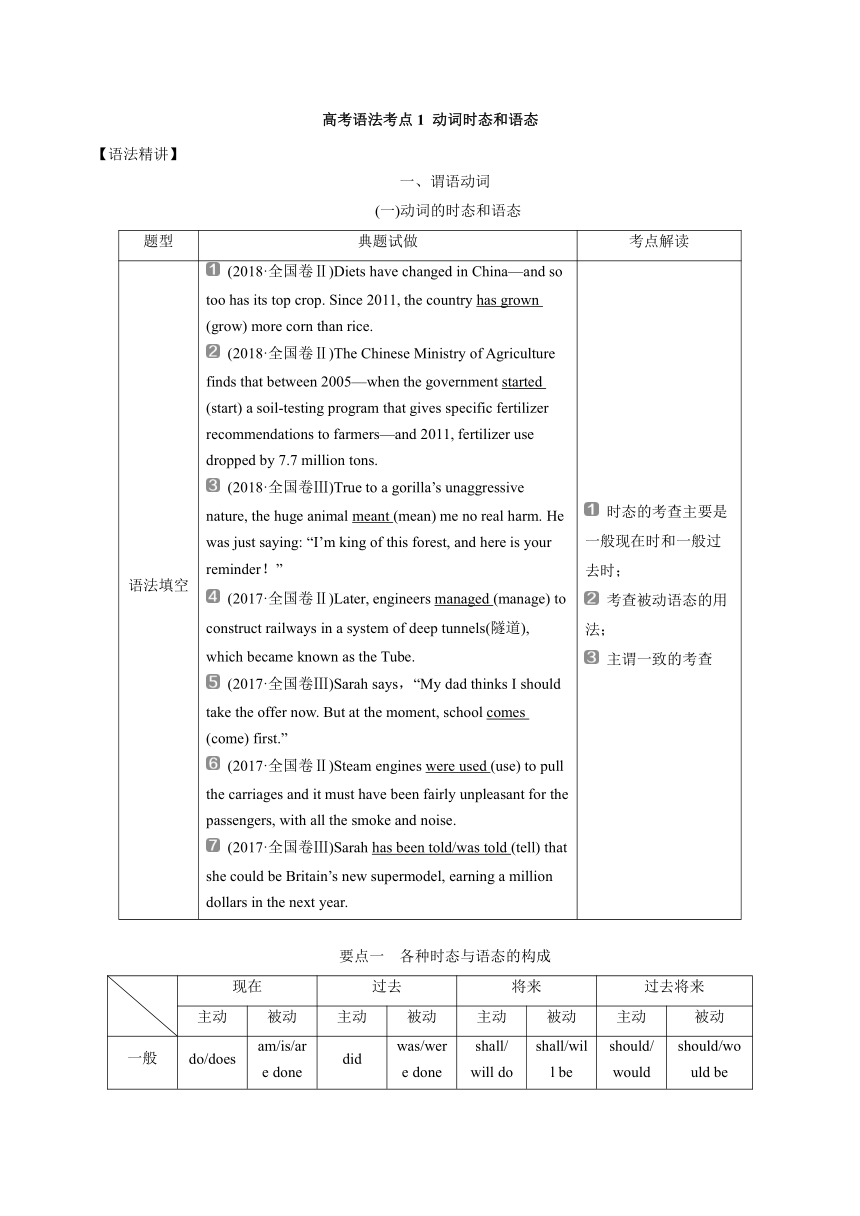
高考语法考点1 动词时态和语态 【语法精讲】 一、谓语动词 (一)动词的时态和语态 题型 典题试做 考点解读 语法填空 (2018·全国卷Ⅱ)Diets have changed in China—and so too has its top crop. Since 2011, the country has grown (grow) more corn than rice. (2018·全国卷Ⅱ)The Chinese Ministry of Agriculture finds that between 2005—when the government started (start) a soil?testing program that gives specific fertilizer recommendations to farmers—and 2011, fertilizer use dropped by 7.7 million tons. (2018·全国卷Ⅲ)True to a gorilla’s unaggressive nature, the huge animal meant (mean) me no real harm. He was just saying: “I’m king of this forest, and here is your reminder!” (2017·全国卷Ⅱ)Later, engineers managed (manage) to construct railways in a system of deep tunnels(隧道), which became known as the Tube. (2017·全国卷Ⅲ)Sarah says,“My dad thinks I should take the offer now. But at the moment, school comes (come) first.” (2017·全国卷Ⅱ)Steam engines were used (use) to pull the carriages and it must have been fairly unpleasant for the passengers, with all the smoke and noise. (2017·全国卷Ⅲ)Sarah has been told/was told (tell) that she could be Britain’s new supermodel, earning a million dollars in the next year. 时态的考查主要是一般现在时和一般过去时; 考查被动语态的用法; 主谓一致的考查 要点一 各种时态与语态的构成 现在 过去 将来 过去将来 主动 被动 主动 被动 主动 被动 主动 被动 一般 do/does am/is/are done did was/were done shall/ will do shall/will be done should/ would do should/would be done 进行 am/is/ are doing am/is/are being done was/were doing was/were being done shall/will be doing shall/will be being done should/would be doing should/would be being done 完成 has/ have done has/have been done had done had been done shall/will have done shall/will have been done should/would have done should/would have been done 完成 进行 has/have been doing \ had been doing \ shall/will have been doing \ should/would have been doing \ 要点二 各种时态的用法 考点一 一、一般现在时 1.表示经常发生的、习惯性的、反复出现的动作或状态。常与表示习惯的副词(词组)always, every time, now and then, occasionally, often, seldom, never, sometimes, usually, every day/night等连用。 ◆(陕西卷)On Monday mornings it usually takes me an hour to drive to work although the actual distance is only 20 miles. 周一早晨开车上班我一般要花费一个小时,虽然实际距离只有20英里。 2.按时间表、时刻表、日程表等安排将要发生的动作,用一般现在时。只限于go, arrive, leave, start, stay, return, begin, come, close等动词。 ◆The shop closes at 11:00 p.m.every day. 这家商店每天晚上11点关门。 3.在时间、条件或让步状语从句中,用一般现在时表示将来。 ◆(江苏卷)The president hopes that the people will be better off when he quits than when he started. 这位总统希望人民在他离任时比他刚上任时更富有。 动词第三人称单数的变化规则 一般情况直接加?s work→works get→gets say→says read→reads 结尾为?s, ?x, ?sh, ?ch或?o,在词尾加?es discuss→discusses wash→washes fix→fixes teach→teaches go→goes 结尾 ... ...
~~ 您好,已阅读到文档的结尾了 ~~

